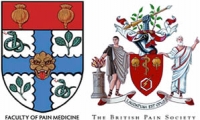e-Pain | A pain Management Programme for Allied Health



Learn how to diagnose and manage pain effectively
e-Pain is designed to help healthcare professionals diagnose and safely manage pain. It is aimed at practitioners who are not pain specialists but who care for patients suffering from acute, chronic and cancer pain. The content is relevant globally.
High-quality pain management training
This programme specifically enables you to:
- improve your recognition of unrelieved acute and chronic pain amongst patients
- provide appropriate assessment
- manage pain effectively
- ensure patient safety
Relevant to healthcare professionals globally
Using the programme, you can explore the physical, psychological and social dimensions of pain. The content is packed with interactive elements, including case studies, animations and self-assessment exercises, to embed learning and understanding.
e-Pain has been developed in the UK by the Faculty of Pain Medicine, of the Royal College of Anaesthetists, the British Pain Society and Health Education England e-Learning for Healthcare.
This programme is a versatile resource and our learners include hospital doctors, medical students, nurses, paramedics, clinical psychologists and primary care practitioners.
Easy online access
You can access e-Pain via the Internet so you can study in the workplace, at home or on the move.
------
eIntegrity programmes are developed by NHS Health Education England’s e-Learning for Healthcare programme (HEE e-LfH).
The programmes are high quality self-directed learning programmes. They are designed to support training and CPD and are excellent resources alongside other traditional teaching methodologies. They have been developed by the UK NHS for use in the NHS. However, many of the programmes have international relevance, particularly the specialty training programmes which are often mapped to UK specialty training curricula.
------
Introducing Pain Management
- Epidemiology and the Burden of Pain
- Definitions and Mechanisms of Pain
- History, Examination and Assessment of Pain
- Common Medications and Therapies for Pain
- Acute Pain Management
Acute Pain
- History, Organisation and Objectives of Acute Pain Teams
- History, Examination and Simple Uni-dimensional Tools
- Perioperative Management of Chronic Pain Patients, including those on Pre-existing Opioid Therapy
- Preventative versus Pre-emptive Analgesia
- Chronic Post-surgical Pain
- Step III: Administration Techniques, Bolus, PRN (as needed), Infusion
- Step III: Administration Techniques, Intravenous Patient-Controlled Analgesia
- Step III: Administration Techniques – Oral, Intramuscular, Subcutaneous, Rectal, Sublingual and Inhaled
Pain as a Long-Term Condition
- Chronic Pain Management
- Predictors for Chronic Pain
- Biopsychosocial Model in Pain Management
Treatment and Therapies
- Non-steroidal Anti-inflammatory Drugs
- Paracetamol
- Opioids – Basic Principles
- Commonly Used Opioids
- Local Anaesthetics
- Multimodal Analgesia
- Assessing Treatment Effectiveness
- Antidepressants and Anticonvulsants
- Multidisciplinary Management of Chronic Pain
- Psychological Assessment and Approach to Treatment
- Interventional Procedures for Pain Relief
- TENS, Acupuncture and Alternative Treatments
Pain Conditions Around the Body
- Primary Headache
- Secondary Headache
- Facial pain - principles and management
- Pelvic Pain - Male and Female
- Visceral Pain
- Central and Widespread Pain
- Complex Regional Pain Syndrome
Musculoskeletal Pain
- The Assessment and Management of Osteoarthritis
- Stratified Care of Low Back Pain
- Supporting People to Stay at Work or Return to Work
- Pain Management in Inflammatory Arthritis
- The Assessment and Management of Vertebral Fractures in Osteoporosis
- Low Back Pain in Sciatica
Neuropathic Pain
- Diagnosis and Evaluation of Neuropathic Pain
- Common Chronic Pain Conditions 1 Postherpetic Neuralgia, Painful Diabetic Peripheral Neuropathy, Trigeminal Neuralgia
Pain in Children
- Pain in Children is Different
- Assessment of Children's Pain
- Acute Pain in Children
- Chronic Pain in Children
- Musculoskeletal Pain in Children
Pain in Older People
- Assessment of Pain in Older Adults
- Common Pain Conditions in Older People
- Medications and Older Adults
- Non-pharmacological Approaches to the Management of Chronic Pain in Older People
Special Populations
- Pain and Analgesia in Pregnancy
- Sickle Cell Pain
- Drug Addiction, Dependency and Pain – Introduction
- Drug Addiction, Dependency and Pain – Management
- Assessment of Pain in Older Adults
- Common Pain Conditions in Older People
Cancer Pain
- Causes and Aetiology of Pain in Cancer
- Pharmacological Cancer Pain Management
- Non-Pharmacological Cancer Pain Management
- Pain in Cancer Survivors
Basic Science
- Anatomy of the Ascending Pain Pathway
- Innervation of the Trunk
- Physiology of Pain Transmission
- Modulation and Plasticity in the Nociceptive System
- Pain and the Peripheral Nervous System
- Pain and the Central Nervous System
- Nociceptive Pain
- Visceral Pain
- Neuropathic Pain
- Psychology Aspects of Acute Pain
- Imaging and Pain

Equips you with the knowledge to assess and manage acute, chronic and cancer pain

Highly interactive content with case studies, animations and questions

Suitable for a wide range of healthcare professionals across the world
Assessing Treatment Effectiveness
Assessing Treatment Effectiveness – This session describes how to compare the effectiveness of different analgesics and explains why combinations of analgesics are usually the most effective.
e-Pain is the perfect educational resource to help the whole multiprofessional team develop their knowledge in pain management, whether they are on the path to specialisation or want to develop their knowledge about pain, the most common concern our patients have.
The e-Pain programme should deliver a step change in the quality, safety, efficacy and patient experience of care in the community and hospital setting.
On completion, you can download and print off a certificate that is endorsed by the relevant professional body.

$17.10

$17.10

$17.10
- Sepsis e-Learning Programme for Allied Health
- Posted By eIntegrity Healthcare e-Learning
- Posted Date: 2024-07-24
- Location:Online
- This high-quality e-learning programme helps healthcare professionals to spot the early signs of sep...
- Paediatric e-Learning Programme for Allied Health
- Posted By eIntegrity Healthcare e-Learning
- Posted Date: 2024-07-24
- Location:Online
- The Paediatric e-Learning Programme is designed to help healthcare professionals develop their skill...
- Healthy Child Programme (HCP) for Allied Health
- Posted By eIntegrity Healthcare e-Learning
- Posted Date: 2024-07-18
- Location:Online
- Multi-professional training in child health The Healthy Child Programme is a high-quality learnin...
- Healthy Child Programme (HCP) for Dietitians
- Posted By eIntegrity Healthcare e-Learning
- Posted Date: 2024-07-18
- Location:Online
- Multi-professional training in child health The Healthy Child Programme is a high-quality learnin...
- Leadership for Clinicians | LeAD Programme for All...
- Posted By eIntegrity Healthcare e-Learning
- Posted Date: 2024-07-16
- Location:Online
- A high-quality healthcare management course Leadership for Clinicians (LeAD) is suitable for all ...







